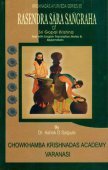Vishacikitsa, Visha-cikitsa, Viṣacikitsā: 6 definitions
Introduction:
Vishacikitsa means something in Hinduism, Sanskrit. If you want to know the exact meaning, history, etymology or English translation of this term then check out the descriptions on this page. Add your comment or reference to a book if you want to contribute to this summary article.
The Sanskrit term Viṣacikitsā can be transliterated into English as Visacikitsa or Vishacikitsa, using the IAST transliteration scheme (?).
Alternative spellings of this word include Vishachikitsa.
In Hinduism
Purana and Itihasa (epic history)
Source: archive.org: Puranic EncyclopediaViṣacikitsā (विषचिकित्सा).—(Treatment for poison). See under Sarpa.

The Purana (पुराण, purāṇas) refers to Sanskrit literature preserving ancient India’s vast cultural history, including historical legends, religious ceremonies, various arts and sciences. The eighteen mahapuranas total over 400,000 shlokas (metrical couplets) and date to at least several centuries BCE.
Ayurveda (science of life)
Toxicology (Study and Treatment of poison)
Source: Shodhganga: Kasyapa Samhita—Text on Visha ChikitsaViṣacikitsā (विषचिकित्सा) refers to the “various aspects of venom (viṣa) of snakes along with the treatment” as taught in the Kāśyapa Saṃhitā: an ancient Sanskrit text from the Pāñcarātra tradition dealing with both Tantra and Viṣacikitsā. The Viṣacikitsā teaches both general first aid as well as specialised treatment and regimen for the different varieties of snakes. The Kāśyapa Saṃhitā deals exclusively and extensively with the symptoms and the corrective herbal treatment for poisonous bites of snakes.
Various modes of treatment like are recommended in different prakaraṇas—
- nasya or nasal spray,
- añjana or herbal ointment,
- lepana (herbal gel),
- pāna (herbal decoctions or drinks),
- bhakṣya (medicinal/herbal diet) and
- gulikā (herbal pills).
Viṣacikitsā also prescribes herbal preparations for Viper-bite and adds one more mode of treatment, namely fumigation. Herbal cure is often accompanied by mantra-prayoga.
Unclassified Ayurveda definitions
Source: Ancient Science of Life: Snake bite treatment in Prayoga samuccayamViṣacikitsā (विषचिकित्सा) refers to “toxicology” and is dealt with in the 20th century Prayogasamuccaya (one of the most popular and widely practised book in toxicology in Malayalam).—Prayoga-samuccayam contains many simple and practically feasible formulations which can be easily prepared and used for managing poisoned conditions. It is a compiled work which contains the cream of many toxicology (viṣacikitsā) books and saṃhitās (compendiums) which can give confidence to young practitioners of Ayurvedic system in handling emergencies with simple combinations.
Viṣacikitsā (toxicology) is given highest importance among the branches of medicine owing to its need for emergency management. The physician who treats a snake bite victim needs to be careful and confident. Slightest mistake can risk the life of the patient. The practice of managing snake bite cases with Ayurvedic drugs is on the decrease these days due to misinformation and lack of research.

Āyurveda (आयुर्वेद, ayurveda) is a branch of Indian science dealing with medicine, herbalism, taxology, anatomy, surgery, alchemy and related topics. Traditional practice of Āyurveda in ancient India dates back to at least the first millenium BC. Literature is commonly written in Sanskrit using various poetic metres.
Shaktism (Shakta philosophy)
Source: Google Books: Goddess Traditions in Tantric HinduismViṣacikitsā (विषचिकित्सा) refers to the “toxicology” section of the Rasaratnākara.—[...] We also have references to [Bheruṇḍā] in the Rasaratnākara’s toxicology (viṣacikitsā) section, Yogaratnāvalī 122, and Bhairavapadmāvatīkalpa 10.12.

Shakta (शाक्त, śākta) or Shaktism (śāktism) represents a tradition of Hinduism where the Goddess (Devi) is revered and worshipped. Shakta literature includes a range of scriptures, including various Agamas and Tantras, although its roots may be traced back to the Vedas.
Shaivism (Shaiva philosophy)
Source: eScholarship: Gāruḍa Medicine (śaivism)Viṣacikitsā (विषचिकित्सा) refers to “poison-medicine” according to the Suśrutasaṃhitā regarding the topic of poisons.—The Suśrutasaṃhitā, which has its entire Kalpasthāna section devoted to the topic of poisons, does not know either word [viz., sarpavidyā and viṣavaidya] and rather uses the term viṣacikitsā (poison-medicine), agadatantra (treatise on antidotes), or viṣatantra (treatise on poisons). The latter two are perhaps the most broad and fitting.
Viṣacikitsā (“curing of poison”) is also a topic dealt with in the Viṣavaidyasārasamuccaya (“collection of the essential teachings of viṣavaidya”).—[...] The introduction by Ashtavaidyan Vaidyamathom Valiya Narayanan Namboodiri (translated from the 1961 Malayalam edition) says that the pūrvārdha treats viṣavijñāna (here “theory of poisons”) whereas the uttarārdha treats viṣacikitsā (“curing of poison”), but the latter half of the pūrvārdha is focused on treating the bites of the cobras, vipers, and kraits—clearly a matter of viṣacikitsā.

Shaiva (शैव, śaiva) or Shaivism (śaivism) represents a tradition of Hinduism worshiping Shiva as the supreme being. Closely related to Shaktism, Shaiva literature includes a range of scriptures, including Tantras, while the root of this tradition may be traced back to the ancient Vedas.
Languages of India and abroad
Sanskrit dictionary
Source: Cologne Digital Sanskrit Dictionaries: Aufrecht Catalogus CatalogorumViṣacikitsā (विषचिकित्सा) as mentioned in Aufrecht’s Catalogus Catalogorum:—med. Gov. Or. Libr. Madras 86.
Sanskrit, also spelled संस्कृतम् (saṃskṛtam), is an ancient language of India commonly seen as the grandmother of the Indo-European language family (even English!). Closely allied with Prakrit and Pali, Sanskrit is more exhaustive in both grammar and terms and has the most extensive collection of literature in the world, greatly surpassing its sister-languages Greek and Latin.
See also (Relevant definitions)
Partial matches: Visha, Cikitsa.
Full-text (+1547): Samjnamantra, Visha, Tuhina, Anjana, Pana, Lepana, Nasya, Bhakshya, Shankha, Vishavijnana, Kurukullamantra, Sarpoccatanamantra, Sarpakarshanamantra, Sarpakarshana, Vishastobha, Mahapadmahridayamantra, Ashtaksharamantra, Nagakrishtimantra, Vidala, Shankhapalahridayamantra.
Relevant text
Search found 2 books and stories containing Vishacikitsa, Visha-cikitsa, Viṣacikitsā, Visacikitsa, Viṣa-cikitsā, Visa-cikitsa; (plurals include: Vishacikitsas, cikitsas, Viṣacikitsās, Visacikitsas, cikitsās). You can also click to the full overview containing English textual excerpts. Below are direct links for the most relevant articles:
Atharvaveda and Charaka Samhita (by Laxmi Maji)
Aṣṭāṅga-Saṃgraha (Āyurveda book) < [Chapter 1 - Introduction]
Viṣa (poison) according to Caraka < [Chapter 4 - Diseases and Remedial measures (described in Caraka-saṃhitā)]
Yogaratnākara (Āyurveda book) < [Chapter 1 - Introduction]
Charaka Samhita (English translation) (by Shree Gulabkunverba Ayurvedic Society)
Chapter 23 - The therapeutics of Toxicosis (visha-cikitsa) < [Cikitsasthana (Cikitsa Sthana) — Section on Therapeutics]
Related products
